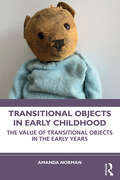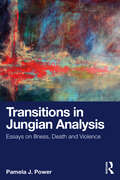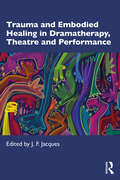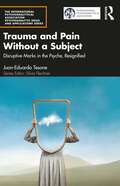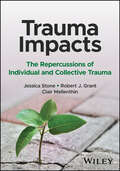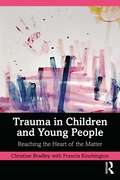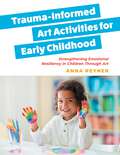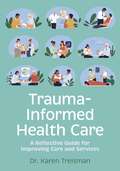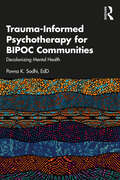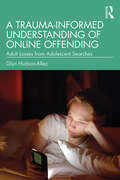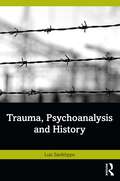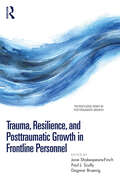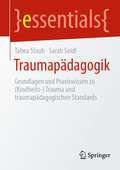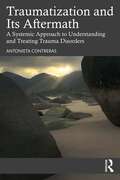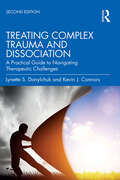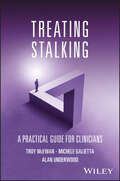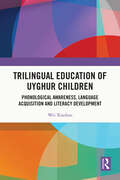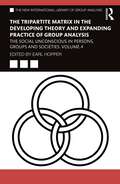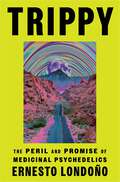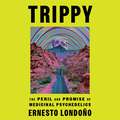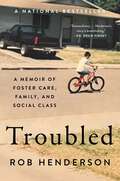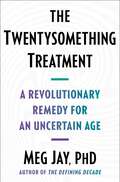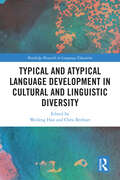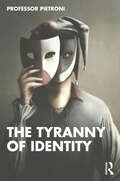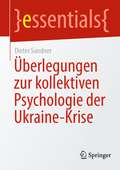- Table View
- List View
Transitional Objects in Early Childhood: The Value of Transitional Objects in the Early Years
by Amanda NormanIn this innovative book, Amanda Norman looks at D. W. Winnicott’s theory of Transitional Objects in early years practice, the ‘good-enough’ parent, and the relationship between the young child and primary carer in relation to the value of Transitional Objects.Norman looks at how an understanding of psychological theories can be useful when caring for young children in both educational and research contexts, aiding those interested in understanding therapeutic relationships, and applying the principles to promote the use of Transitional Objects in their work. Throughout the book, Norman uses case studies from parents, children, and practitioner’s perspectives in supporting physical and emotional development. Through these, she shows how observing Transitional Objects is particularly relevant to living in the west, where a low touch, high technology culture prevails, compounded by the recent pandemic. This volume contributes to a timely connection between the understanding and application of therapeutic approaches within early educational contexts. Including engaging exercises at the end of each chapter, this book is a perfect companion for those approaching the concept of Transitional Objects for the first time.Transitional Objects in Early Childhood is vital reading for those with an interest in the psychology of the infant/young child and their relationship and realities with the external world. It will be of particular interest to those specialising in infant and child care who wish to develop their knowledge of emotional development through play, as well as those working in a variety of social, education, and health contexts.
Transitions in Jungian Analysis: Essays on Illness, Death and Violence
by Pamela J. PowerThis deeply personal book contains essays and articles that portray the evolution of the author as a practicing Jungian analyst. Themes of illness, death, and violence are inherent within the chapters of this book. She uses metaphors from music to describe transitions, some involve literal death, and others are metaphorical. The chapters of this book provide an engaging and readable review of life from one Jungian psychoanalyst, featuring essays on topics such as physical illness, film, music, video games, and her dog. The author covers problematic psychological and physical conditions, each of which, through exploration and inquiry, provides a transition to a new depth of understanding and a renewed sense of self. The book begins with the death of Power’s Jungian analyst and the subsequent experiences when she began a "new analysis." She describes a "mysterious illness" that took her from being a classical musician to becoming a Jungian analyst. Other chapters include one on the nature of violence, another on the clinical issue of the "negative coniunctio" in the consulting room, and another on body symptoms and illness as "vanishing mediators" that take her from one status to another. A personal and engaging read, this new collection by an experienced analyst will be of interest to Jungian analysts, clinicians in both analytical psychology and psychoanalysis, and those undertaking psychoanalytic training.
Trauma and Embodied Healing in Dramatherapy, Theatre and Performance
by J. F. JacquesThis edited volume explores the singularity of embodiment and somatic approaches in the healing of trauma from a dramatherapy, theatre and performance perspective.Collating voices from across the fields of dramatherapy, theatre and performance, this book examines how different interdisciplinary and intercultural approaches offer unique and unexplored perspectives on the body as a medium for the exploration, expression and resolution of chronic, acute and complex trauma as well as collective and intergenerational trauma. The diverse chapters highlight how the intersection between dramatherapy and body-based approaches in theatre and performance offers additional opportunities to explore and understand the creative, expressive and imaginative capacity of the body, and its application to the healing of trauma.The book will be of particular interest to dramatherapists and other creative and expressive arts therapists. It will also appeal to counsellors, psychotherapists, psychologists and theatre scholars.
Trauma and Pain Without a Subject: Disruptive Marks in the Psyche, Resignified (The International Psychoanalytical Association Psychoanalytic Ideas and Applications Series)
by Juan-Eduardo TesoneTrauma and Pain Without a Subject explores the necessity of the subject of trauma emerging, particularly when a victim has experienced but not worked through disruptive situations, in order for unconscious pain to finally be experienced.The book is presented in three parts, with the first, "Transgression and Crime", uncovering silence around the topic of incest and sexual violence within the clinic. The second part, "Between Completeness and Nothingness", develops the topic of sexual violence and considers the construction of femininities and masculinities within the paradigm of a heteronormative patriarchal society, with reference to Shakespeare’s Much Ado About Nothing. The third part, “Yes, We See, But What? What We Hear”, explores the intimate relation between the visual and the auditory, especially in relation to hysteria.Trauma and Pain Without a Subject will be of great interest to psychoanalysts in practice and in training, and to all psychoanalytic practitioners working with trauma.
Trauma Impacts: The Repercussions of Individual and Collective Trauma
by Jessica Stone Robert J. Grant Clair MellenthinA systems-oriented look at how unhealed trauma can prevent optimal functioning—and what to do about it Trauma Impacts: Repercussions of Individual and Collective Trauma explores the many ways that traumatic experiences affect people from diverse backgrounds, as individuals and in groups. In chapters contributed by experts in their fields, this book offers a systemic overview of how trauma impacts all humans, then delves into the manifestations of trauma in specific populations like BIPOC communities, neurodivergent children, and those in helping professions. The book's third and final section looks at emerging modalities for working with trauma and implications for the future of trauma-focused therapy. Ideal for anyone who works closely with individuals who have experienced trauma—therapists, educators, social workers, and beyond—Trauma Impacts will benefit from a thorough understanding on how trauma continues to influence lives, even long after the fact. Trauma can interfere with meeting basic needs, forming healthy relationships, and finding fulfillment in the pursuit of individual and collective goals. When we conceptualize these impacts, we become empowered to help people process their traumatic experiences, integrate the pain they have experienced, and lead more satisfying lives. Understand the intersectional effects of trauma on individuals and systems Discover hope for healing through real-world voices and current research Consider how collective trauma manifests in the lives of individuals Gain insights that can help you work more effectively with clients
Trauma in Children and Young People: Reaching the Heart of the Matter
by Christine Bradley Francia KinchingtonThis book offers a unique combination of an in-depth examination of attachment, a refined and tested model of Needs Assessment and Therapeutic Treatment plans and applies it to specific contexts including those of children in residential/foster care, young offenders, and unaccompanied asylum-seeking minors. Trauma in Children and Young People, the culmination of 40 years of experience in the field, focuses on the lives of children and young people who have experienced and live with the repercussion of early trauma. Accompanied with case studies, it examines how therapeutic intervention can enable children and young people to connect with their inner world of fragmented feelings and emotions and to develop a sense of ‘self’ that is real and has meaning. This book is intended for professionals working therapeutically with traumatised children, such as therapists, psychologists, psychiatrists, mental health workers, social pedagogues, child and youth care workers, social workers, residential care workers and foster carers, teachers, youth justice workers, and child refugee agencies.
Trauma-Informed Art Activities for Early Childhood: Using Process Art to Repair Trauma and Help Children Thrive
by Anna ReynerWhy Art & Trauma? By making their own choices as they engage in sensory art experiences, children gain confidence, release stress, express emotions, and develop critical-thinking skills. Art offers a unique opportunity for children to safely experiment with the physical world and re-wire their brains to reduce the negative effects of trauma, all while learning to identify as creative thinkers. This highly illustrated and easy-to-use resource supports trauma-informed work with children ages 3-8. It delves into both the theory and practice of therapeutic art and includes 21 original art lessons and 60 art techniques, all presented visually for ease of use. Both text and illustrations demonstrate how to create a safe, non-retraumatizing environment for children to experience safety, connection and calm. Ideal for implementing into classroom environments, including preschools, kindergarten, early primary grades, afterschool programs, child counselling centers and community-based youth programs, this professional resource is perfectly adaptable for a variety of educational and therapeutic contexts.
Trauma-Informed Health Care: A Reflective Guide for Improving Care and Services
by Dr. Karen TreismanThis comprehensive reflective resource explores the values, principles and practical applications of trauma-informed and -infused health care. Trauma-Informed Health Care introduces the different types of trauma - including medical and health trauma - and the impact of adversities, social inequalities and stressors. It explores their effects on health and the body, and on people's relationships with health providers. Key issues addressed include the importance of cultural humility, the effects of secondary and vicarious trauma, burnout and moral injury. It also covers the critical issue of organizational trauma: how to avoid practice which has potential to traumatize or retraumatize, and the role of cultural understanding, language, leadership, staff wellbeing and the physical environment.Drawing substantially on the experiences of people who use services and active practitioners, this book spans diverse settings -- from doctor's surgeries to hospitals and allied health services. It reveals how "every interaction can be an intervention" and provides you with practical examples, graphics and reflective exercises to support you to bring about positive change.
Trauma-Informed Psychotherapy for BIPOC Communities: Decolonizing Mental Health
by Pavna K. SodhiGrounded in trauma-informed approaches, intersectionality theory, and critical race theory, Trauma-Informed Psychotherapy for BIPOC Communities: Decolonizing Mental Health embodies psychotherapeutic practices via anti-racist, anti-oppressive, and culturally responsive paradigms.Complete with practical case studies, psychoeducational frameworks, and the author’s own inclusion and healing therapy (IHT) model, content from this book inspires practitioners to update their therapeutic competencies to effectively support BIPOC clients.This book is an essential read for current and future intersectional psychologists, psychotherapists, social workers, counsellors, lawyers, educators, and healthcare professionals who actively work with BIPOC communities.
A Trauma-Informed Understanding of Online Offending: Adult Losses from Adolescent Searches
by Glyn Hudson-AllezThis book examines the contemporary one-size-fits-all model of treatment for sexual offenders and challenges the confrontational approach to working with this group. In recent years, the incidence of people (predominantly men) getting arrested for inappropriate online usage has increased exponentially. This book attempts to understand why this is the case and what can be done to help these individuals and, in turn, reduce the risk of them re-offending. A stand-alone follow-up text from Hudson-Allez’s popular Infant Losses, Adult Searches, this book carries forward the compelling case study of Gordon from the previous text. Throughout his journey from arrest to rehabilitation, the chapters provide insight into the relationship between internet offending and dysfunctional attachments and neurodiversity. Our current understandings of childhood trauma, transgenerational transmission, and diagnoses of autism spectrum disorder and ADHD are all investigated in relation to cases of online offenders and practical therapeutic models are presented. This book is relevant to psychologists, psychotherapists, counsellors and therapists working with forensic clients, and probation officers, social workers and police officers working within child-protection agencies.
Trauma, Psychoanalysis and History
by Luis SanfelippoLocated at the crossroads of psychoanalysis and history, this book investigates the ambiguous concept of trauma and the changes to its formulation and use between the years 1866 and 1939. Luis Sanfelippo introduces the original conceptions of trauma outlined by Sigmund Freud, Pierre Janet and their contemporaries, before investigating how the meaning of this concept was influenced and informed by large-scale historical events like the First World War. Trauma, Psychoanalysis and History investigates the multiple problems linked to this fetishised category and how it has developed over time. Sanfelippo also considers the historiographical and conceptual problems raised by the application of trauma to collective memory and contemporary history, reflecting on what this means for historiography. Trauma, Psychoanalysis and History will be of great interest to students in training for psychotherapy and mental health practice, trained psychoanalysts, as well as academics and scholars of psychoanalytic studies, the history of psychology, trauma studies and modern history.
Trauma, Resilience, and Posttraumatic Growth in Frontline Personnel (The Routledge Series in Posttraumatic Growth)
by Jane Shakespeare-Finch Paul J. Scully Dagmar BruenigTrauma, Resilience, and Posttraumatic Growth in Frontline Personnel examines the history, context, nature, and complexity of working in front-line services. Chapters provide a detailed overview of specific mental health models that are applicable both on a day-to-day basis and to disaster and major event response. The book also details elements of mental health responses that have been proven to facilitate coping, minimize risk, and promote both resilience and posttraumatic growth. These strategies include, but are not limited to, peer support programs, mental health education, and psychological first aid. Each chapter incorporates research on PTSD, anxiety, and depression as well as research relating to posttraumatic growth, resilience, connectedness, and belongingness. Trauma, Resilience, and Posttraumatic Growth in Frontline Personnel is a vital guide for those who provide care to trauma survivors as well as for researchers and scholars.
Traumapädagogik: Grundlagen und Praxiswissen (Kindheits-) Trauma und traumapädagogische Standards (essentials)
by Tabea Staub Sarah SeidlDieser Band liefert fundiertes Grundlagenwissen für die Arbeit mit traumatisierten Kindern und Jugendlichen und bietet damit Fachkräften die notwendige Sicherheit in der täglichen Arbeit. In der stationären Jugendhilfe sind Traumata bei Kindern und Jugendlichen in einem überdurchschnittlich hohen Maße vorzufinden. Dadurch sind Fachpersonen in diesen Berufsfeldern fast tagtäglich mit dieser Thematik und den daraus resultierenden Auswirkungen konfrontiert. Umso wichtiger ist ein fundiertes Wissen zu Trauma und Traumapädagogik, welches dieser Band für Fachkräfte praxisnah aufbereitet. .
Traumatization and Its Aftermath: A Systemic Approach to Understanding and Treating Trauma Disorders
by Antonieta ContrerasTraumatization and Its Aftermath delves deep into the complexities of traumatization and is a practical, comprehensive guide to understanding and overcoming the impacts of adverse circumstances. In these pages, readers will gain valuable insights into trauma’s diverse forms and the importance of understanding traumatization on an individual level. This book answers questions including "Why don’t some people heal as easily as others?" "Why do some people experience trauma after ‘seemingly insignificant’ incidents?" and "Why does overdiagnosis fail so many people?" Readers can also find criteria for evaluating their own trauma, information on how to heal from a trauma disorder, and better ways for treating complex trauma. Traumatization and Its Aftermath guides readers through each element of the personalized struggle for survival and offers compassionate and patient explanations on how to shorten this struggle—and even prevent it. Packed with detailed resources and accessible storytelling, this book is a must read for clinicians and anyone looking to better understand the mind, body, and natural ability to heal.
Treating Complex Trauma and Dissociation: A Practical Guide to Navigating Therapeutic Challenges
by Lynette S. Danylchuk Kevin J. ConnorsTreating Complex Trauma and Dissociation is the ideal guide for the front-line clinician whose clients come in with histories of trauma, abuse, self-injury, flashbacks, suicidal behavior, and more. The second edition includes the latest research and developments in treatment for trauma and dissociative disorders. The book is written with the knowledge that survivors may read it, and the authors have consciously maintained the dignity of the survivors throughout. Clinicians will find that the chapters help them develop their own responses and practical solutions to common questions, including "How do I handle this?" "What do I say?" and "What can I do?" Treating Complex Trauma and Dissociation is the book clinicians will want to pick up when they're stuck and is a handy reference that provides the tools needed to deal with difficult issues in therapy. It is supportive and respectful of both therapist and client, and, most of all, useful in the office.
Treating Stalking: A Practical Guide for Clinicians
by Troy McEwan Michele Galietta Alan UnderwoodTREATING STALKING Understand and address the drivers of stalking behaviour with this vital guide In the thirty-five years since stalking was identified as harmful behaviour, addressing its social effects has largely fallen to criminal justice systems. There is, however, significant evidence to suggest that pure criminalisation has limited meaningful impact. Mental health and other interventions for people who stalk may be the only serious path to relief for many stalking victims. Despite this, robust research into treatment for people who stalk remains rare, and relevant resources for treatment providers few. Treating Stalking is the first comprehensive guide for clinicians on this vital subject. It outlines 10 principles of effective intervention and gives detailed, practical, advice about delivering psychological and other treatment. It’s content draws on decades of research and clinical experience, but Treating Stalking also proposes a stalking research agenda to help ensure that future practice is evidence-based. Treating Stalking readers will also find: Case examples and worksheets from the authors’ psychological practice Detailed advice on assessment, risk assessment, case formulation, and ethical and legal issues Discussion of multidisciplinary and multiagency management to help stop stalking Treating Stalking is a must-have for any psychologist or other mental health professional looking to treat patients who stalk.
Trilingual Education of Uyghur Children: Phonological Awareness, Language Acquisition and Literacy Development
by Wei XiaobaoGiven the differences in the orthographic structure of the Uyghur, Chinese and English languages, this study used a mixed-method approach to systematically describe and analyze the phonological awareness of Uyghur bilingual children as English learners and its contributions to their trilingual literacy acquisition and development.Focusing on the development of these learners' phonological awareness in Uyghur, Chinese and English, this study explored the influences of Uyghur and Chinese learning on the formation of their English phonological awareness and the roles of different components of phonological awareness in their trilingual literacy development. Based on the characteristics of the phonetic structure in Uyghur, Chinese and English and the development of Uyghur children's phonological awareness in these languages, a Chinese phonetic identification training and Uyghur–Chinese–English comprehensive phonetic training program (including intensive phoneme category contrast training and phonics training) was designed to explore whether such targeted phonetic identification training can effectively improve these children's phonological awareness in Chinese and English and thus further promote their trilingual literacy development.This book will appeal to researchers and students interested in the fields of psycholinguistics, language acquisition and multilingual education.
The Tripartite Matrix in the Developing Theory and Expanding Practice of Group Analysis: The Social Unconscious in Persons, Groups and Societies: Volume 4 (The New International Library of Group Analysis)
by Earl HopperThe Tripartite Matrix in the Developing Theory and Expanding Practice of Group Analysis explores the social unconscious in persons, groups and societies in terms of the "un-acknowledged" restraints and constraints of our social and cultural groupings. In this context, Earl Hopper and an international team of contributors elucidate the theory and concept of the tripartite matrix as a tool for the deeper understanding of the human condition and for clinical work in various settings. They consider topics ranging from envy to intersectionality, and from addiction to the inability to mourn. The Tripartite Matrix in the Developing Theory and Expanding Practice of Group Analysis will be of great interest to group analysts, psychoanalytical group therapists, psychoanalysts and psycho-dramatists, as well as to social scientists more generally. Its extensive bibliography will be of particular value to students.
Trippy: The Peril and Promise of Medicinal Psychedelics
by Ernesto LondoñoA moving, tender and thoughtful exploration of a complicated subject. Johann Hari, Sunday Times bestselling author of Stolen Focus and Lost ConnectionsA compulsively readable romp through a burgeoning scene that has immense potential for both harm and healing.Dan Harris, New York Times bestselling author of 10% Happier and host of the Ten Percent Happier podcastCourageous and revelatory... This journey inside the brain and around the world taught me more than any book I've read in a long time. It's an important book, one that will save people's lives.Benjamin Moser, Pulitzer Prize winning author of Sontag: Her Life and WorkWhen he signed up for a psychedelic retreat deep in the Brazilian rainforest, veteran New York Times journalist Ernesto Londoño was so depressed that he had come close to attempting suicide just weeks earlier. To his astonishment, the nine-day ayahuasca experience provided Londoño an instant reprieve from his depression and became the genesis of a personal transformation that anchors this sweeping exploration of the booming field of medicinal psychedelics. Londoño's deeply researched and brilliantly reported account introduces readers to a dazzling array of psychedelic enthusiasts who are upending our understanding of trauma and healing. From Indigenous elders who regard psychedelics as portals to the spirit world to religious leaders using mind-bending substances as sacraments, as well as war veterans who credit psychedelics with alleviating their PTSD, and clinicians trying to resurrect a promising field of medicine hastily abandoned in when the War on Drugs was announced in the 1970s.Trippy is the definitive book of psychedelics and mental health today, an in-depth and nuanced look at this booming industry which makes sense of the perils, limitations and promise of turning to psychedelics in the pursuit of healing.
Trippy: The Peril and Promise of Medicinal Psychedelics
by Ernesto LondoñoA moving, tender and thoughtful exploration of a complicated subject. Johann Hari, Sunday Times bestselling author of Stolen Focus and Lost ConnectionsA compulsively readable romp through a burgeoning scene that has immense potential for both harm and healing.Dan Harris, New York Times bestselling author of 10% Happier and host of the Ten Percent Happier podcastCourageous and revelatory... This journey inside the brain and around the world taught me more than any book I've read in a long time. It's an important book, one that will save people's lives.Benjamin Moser, Pulitzer Prize winning author of Sontag: Her Life and WorkWhen he signed up for a psychedelic retreat deep in the Brazilian rainforest, veteran New York Times journalist Ernesto Londoño was so depressed that he had come close to attempting suicide just weeks earlier. To his astonishment, the nine-day ayahuasca experience provided Londoño an instant reprieve from his depression and became the genesis of a personal transformation that anchors this sweeping exploration of the booming field of medicinal psychedelics. Londoño's deeply researched and brilliantly reported account introduces readers to a dazzling array of psychedelic enthusiasts who are upending our understanding of trauma and healing. From Indigenous elders who regard psychedelics as portals to the spirit world to religious leaders using mind-bending substances as sacraments, as well as war veterans who credit psychedelics with alleviating their PTSD, and clinicians trying to resurrect a promising field of medicine hastily abandoned in when the War on Drugs was announced in the 1970s.Trippy is the definitive book of psychedelics and mental health today, an in-depth and nuanced look at this booming industry which makes sense of the perils, limitations and promise of turning to psychedelics in the pursuit of healing.
Troubled: A Memoir of Foster Care, Family, and Social Class
by Rob HendersonIn this raw coming-of-age memoir, in the vein of The Short and Tragic Life of Robert Peace, The Other Wes Moore, and Someone Has Led This Child to Believe, Rob Henderson vividly recounts growing up in foster care, enlisting in the US Air Force, attending elite universities, and pioneering the concept of &“luxury beliefs&”—ideas and opinions that confer status on the upper class while inflicting costs on the less fortunate.Rob Henderson was born to a drug-addicted mother and a father he never met, ultimately shuttling between ten different foster homes in California. When he was adopted into a loving family, he hoped that life would finally be stable and safe. Divorce, tragedy, poverty, and violence marked his adolescent and teen years, propelling Henderson to join the military upon completing high school. An unflinching portrait of shattered families, desperation, and determination, Troubled recounts Henderson&’s expectation-defying young life and juxtaposes his story with those of his friends who wound up incarcerated or killed. He retreads the steps and missteps he took to escape the drama and disorder of his youth. As he navigates the peaks and valleys of social class, Henderson finds that he remains on the outside looking in. His greatest achievements—a military career, an undergraduate education from Yale, a PhD from Cambridge—feel like hollow measures of success. He argues that stability at home is more important than external accomplishments, and he illustrates the ways the most privileged among us benefit from a set of social standards that actively harm the most vulnerable.
The Twentysomething Treatment: A Revolutionary Remedy for an Uncertain Age
by Meg JayThe author of The Defining Decade explains why the twenties are the most challenging time of life and reveals essential skills for handling the uncertainties surrounding work, love, friendship, mental health, and more during that decade and beyond.There is a young adult mental health crisis in America. So many twentysomethings are struggling—especially with anxiety, depression, and substance use—yet, as a culture, we are not sure what to think or do about it. Perhaps, it is said, young adults are snowflakes who melt when life turns up the heat. Or maybe, some argue, they&’re triggered for no reason at all. Yet, even as we trivialize twentysomething struggles, we are quick to pathologize them and to hand out diagnoses and medications. Medication is sometimes, but not always, the best medicine. For twenty-five years, Meg Jay has worked as a clinical psychologist who specializes in twentysomethings, and here she argues that most don&’t have disorders that must be treated: they have problems that can be solved. In these pages, she offers a revolutionary remedy that upends the medicalization of twentysomething life and advocates instead for skills over pills. In The Twentysomething Treatment, Jay teaches us: -How to think less about &“what if&” and more about &“what is.&” -How to feel uncertain without coming undone. -How to work—at work—toward competence and calm. -How to be social when social media functions as an evolutionary trap. -How to befriend someone and why this is more crucial for survival than ever. -How to love someone even though they may break your heart. -How to have sex when porn is easier and more available. -How to move, literally, toward happiness and health. -How to cook your way into confidence and connection. -How to change a bad habit you may not know you have. -How to decide when so much about life is undecided. -How to choose purpose at work and in love. The Twentysomething Treatment is a book that offers help and hope to millions of young adults—and to the friends, parents, partners, teachers, and mentors who care about them—just when they need it the most. It is essential reading for anyone who wants to find out how to improve our mental health by improving how we handle the uncertainties of life.
Typical and Atypical Language Development in Cultural and Linguistic Diversity (Routledge Research in Language Education)
by Weifeng Han and Chris BrebnerTypical and Atypical Language Development in Cultural and Linguistic Diversity brings together state-of-the-art studies in both typical and atypical language development. Placing the topic in the context of cultural and linguistic diversity (CALD), the book offers readers serious theoretical consideration of the topic and provides implications for multilingual educational and clinical practices. The content covers a wide range of topics related to multilingual language development in CALD: typical and atypical language development in CALD, and the interface between both; the relationship between multilingual competence and academic performance in CALD; providing unbiased speech and language measures in CALD; and heritage and minority languages education in CALD. Each chapter outlines the core theoretical and practical issues and explores both theoretical and pedagogical/clinical implications in the area and possible future developments. This volume is an essential resource for all those who study, research, or are interested in multilingual development, educational linguistics, and clinical linguistics in the CALD context.
The Tyranny of Identity
by Patrick PietroniThe Tyranny of Identity is both a personal and highly interdisciplinary examination of the wide range of factors and disciplines at play in the formation of identity. It takes a novel and unique approach to this through use of metaphor, images, poetry and a wide range of academic sources to provide a holistic approach to the study of identity. This book uses the concept of Babushka dolls to show that we all have a series of activities during our lives that reside in our mind, body, spirit – each influencing the multiple identities we knowingly or unknowingly possess. This collage of factors and forces allows us to create an identity. The layers of identity unfold as the chapters progress and in doing so the book addresses the manifold ways in which identity intersects with nationhood, politics, education, the culture wars, family, religion, gender and contemporary institutions. The Tyranny of Identity is a wide-ranging, cross-cultural book that integrates and explores how the issue of identity has become a central issue in every academic discipline. This book is essential reading to all students studying identity and all readers seeking a deeper understanding of this complex topic.
Überlegungen zur kollektiven Psychologie der Ukraine-Krise (essentials)
by Dieter SandnerDiese essentials vermitteln kurz und prägnant wie es zur Entstehung und Beibehaltung einer kollektiven psychologischen Überzeugung in Deutschland gekommen ist, die sich zu Beginn des russischen Einmarsches in die Ukraine innerhalb von wenigen Tagen entwickelt hat. Exemplarisch wird herausgearbeitet, dass es sich hierbei um eine kollektive psychologische Dynamik handelt, die spontan entsteht, wenn sich eine Gesellschaft insgesamt bedroht fühlt. Diese Interpretationen werden mit Interpretationen der russischen Seite und dem realen Verhalten der russischen Regierung konfrontiert. Schließlich wird dargelegt, inwiefern eine kollektive psychologische Analyse eine Lösung der Ukraine Krise ermöglichen könnte.
